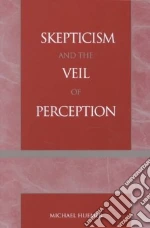 Libri di Michael Huemer su Unilibro.it
)
Libri di Michael Huemer su Unilibro.it
)
|
|
1919 |
 Title :
Dialogues on Ethical Vegetarianism
Title :
Dialogues on Ethical VegetarianismAuthor: Michael Huemer Publisher: ROUTLEDGE € 18,70
|
|
|
1916 |
 Title :
Approaching Infinity
Title :
Approaching InfinityAuthor: Huemer Michael Publisher: Palgrave Macmillan € 29,90
|
|
|
2016 |
 Title :
Il problema dell'autoritą politica. Un esame del diritto di obbligare e del dovere di obbedire
Title :
Il problema dell'autoritą politica. Un esame del diritto di obbligare e del dovere di obbedireAuthor: Huemer Michael Publisher: Liberilibri € 22,00
|
|
|
1912 |
 Title :
The Problem of Political Authority
Title :
The Problem of Political AuthorityAuthor: Huemer Michael Publisher: Palgrave Macmillan Modern states commonly deploy coercion in a wide array of circumstances in which the resort to force would clearly be wrong for any private agent. What entitles the state to behave in this manner? And why should citizens obey its commands? This book examines theories of political authority, from the social contract theory, to theories of democratic authorization, to fairness- and consequence-based theories. Ultimately, no theory of authority succeeds, and thus no government has the kind of authority often ascribed to governments. The author goes on to discuss how voluntary and competitive institutions could provide the central goods for the sake of which the state is often deemed necessary, including law, protection from private criminals, and national security. An orderly and livable society thus does not require acquiescence in the illusion of political authority. € 41,10
|
|
|
2002 |
 Title :
Epistemology
Title :
EpistemologyAuthor: Huemer Michael (EDT), Audi Robert (INT) Publisher: Routledge This comprehensive anthology draws together classic and contemporary readings by leading philosophers on epistemology. Ideal for any philosophy student, it will prove essential reading for epistemology courses, and is designed to complement Robert Audi's textbook Epistemology: A Contemporary Introduction (Routledge, 1998). Themes covered include, perception, memory, inductive inference, reason and the a priori, the architecture of knowledge, skepticism, the analysis of knowledge, testimony. Each section begins with an introductory essay, guiding students into the topic. Includes articles by: Russell, Hume, Berkeley, Malcolm, Quine, Carnap, J.L. Austin, Pollock, Nozick, Putnam, G.E. Moore, Huemer, Reid, Plato, BonJour, Coady, Carroll, Fumerton, Edwards, Foster, Howson, Urbach, Stove, Empiricus, Oakley, Alston, Gettier, Clark, Goldman, Lehrer, Paxson, DeRose, Dretske, Klein and Chisholm € 60,60
|
|
|
2001 |
 Title :
Skepticism and the Veil of Perception
Title :
Skepticism and the Veil of PerceptionAuthor: Huemer Michael Publisher: Rowman & Littlefield Pub Inc In opposition to both skeptics and representationalists, Huemer (philosophy, U. of Colorado, Boulder) presents a theory of perceptual awareness, according to which perception gives us direct awareness of real objects and non-inferential knowledge of the properties of these objects. He responds to the major arguments for skepticism, including the infinite regress argument, the problem of the criterion, the brain in the vat, and the impossibility of verification. Annotation c. Book News, Inc., Portland, OR (booknews.com) € 48,90
|